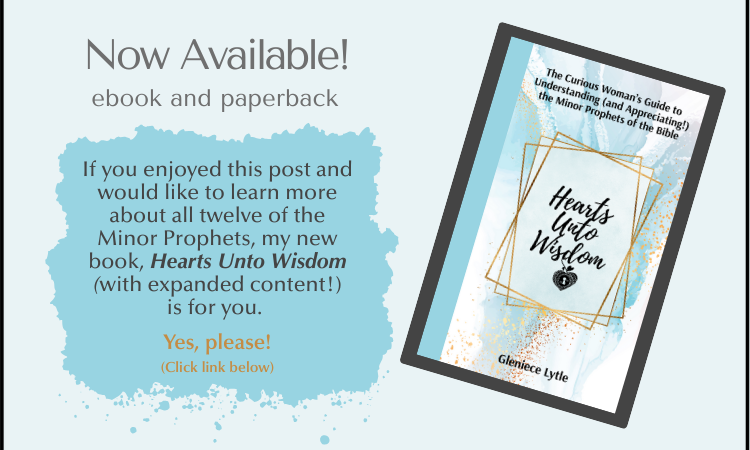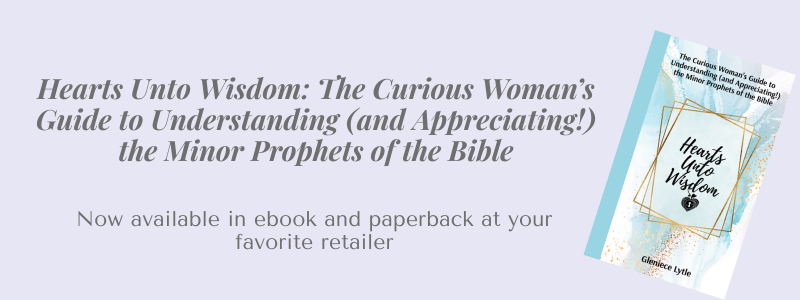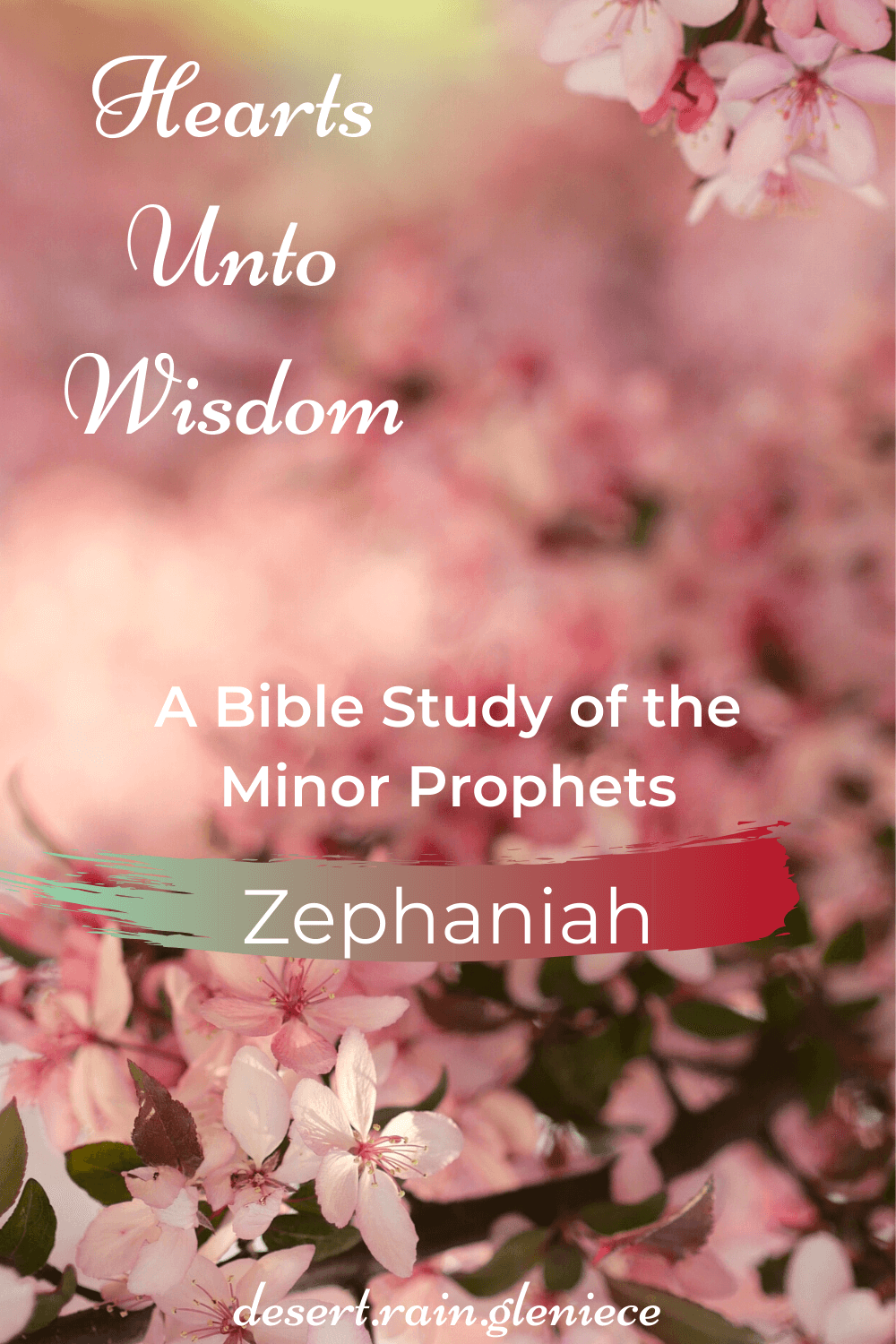God’s love for us is astounding. We are filthy, yet He makes us clean (John 15:3). We are lost, yet He searches long to find us (Ezekiel 34:16). We are dead because of sin, yet God graciously gives us life through the sacrifice of His Son, Jesus Christ (Romans 5:21).
In the book of Zephaniah, God pleads with us to seek Him, to obey Him, to live righteously and humbly, to gather ourselves together while there’s still time, that we might be hidden in the day of the Lord.
Seek ye the Lord, all ye meek of the earth, which have wrought his judgment; seek righteousness, seek meekness: it may be ye shall be hid in the day of the Lord’s anger. (Zephaniah 2:3)
Zephaniah’s name means “Jah (the Lord) has secreted.” It means, “to hide, to reserve, to protect, and to deny.” God wants to hide us under His wing, to reserve us unto Himself, to protect us from evil, and to deny us His coming wrath. How wonderful to be secreted by God!
Welcome to Hearts Unto Wisdom
A Bible Study of the Minor Prophets
I thank you for joining me as I share biblical insight into the twelve books commonly referred to as the “Minor Prophets.” These Old Testament books, starting with Hosea and ending with Malachi, are minor only in regard to their length, and not because they lack significance.
So teach us to number our days, that we may apply our hearts unto wisdom. (Psalm 90:12)
[Words in bold or italics added for emphasis to Bible verses throughout this study.]
Zephaniah
Biblical books of prophecy, like Zephaniah, have dual purposes. They warned those being addressed of God’s soon-to-be wielded judgment, as well as warn the entire world of future judgment. Zephaniah opens with dire proclamations against Jerusalem for their rebellion, and against Moab and Ammon for their pride and wickedness, but it also foreshadows events of the end times that apply to us all.
Ah, pride—we’ve all felt it. That swelling of joy over something our child accomplished, that wahoo feeling when we excel at a difficult task. Look what I did! Yes, it’s exciting. But where we go wrong is forgetting where all our talent and blessings come from—God. Our excellence, our achievements, our wins are, of a truth, His.
Dark pride drives us to shun lowly, unappreciated service; we glory in accolades instead. When infected with pride, we refuse to forgive (we’re right, after all). Pride inflates our sense of worth and thinks we deserve more than what we’ve got. Our excellence, our achievements, our wins are ours. Look what I did! The pride of achievement can easily morph into arrogance, self-reliance, and an unteachable spirit. Pride knows better than God.
In Zephaniah, God pronounces the destruction of Moab and Ammon (descendants of the incestuous offspring [Genesis 19:36–38] of Lot and his daughters) and several other kingdoms with their cities that were hostile to Jerusalem: Canaan (the land of the Philistines and the Cherithites), Gaza, Ashkelon, Ashdod, Ekron, Ethiopia, Assyria, with Nineveh, her capitol.
Their power and wealth filled them with pride and a desire to conquer others. They dwelt carelessly and rejoiced in their hearts saying, “I am and there is none beside me” (Zephaniah 2:15).
Therefore hear now this, thou that art given to pleasures, that dwellest carelessly, that sayest in thine heart, I am, and none else beside me; I shall not sit as a widow, neither shall I know the loss of children. (Isaiah 47:8)
But God is the great I AM (Exodus 3:14). Only He has this distinctive title. Christ, the Word of the Old Testament, told the Pharisees “before Abraham was, I AM” (John 8:58).
In Judah’s day, God’s punishment was imminent and bitter to those He spoke against. Likewise, Christ’s return and righteous judgment is imminent and will be bitter to the mighty and unprepared.
The great day of the Lord is near, it is near, and hasteth greatly, even the voice of the day of the Lord: the mighty man shall cry there bitterly. (Zephaniah 1:14)
Who are the mighty?
Anyone, great or small, rich or poor, unwilling to yield to God. They are mighty in their own eyes, proud of their life apart from God.
Who are the unprepared?
Those who claim Christ’s name but are settled on their less. In the Bible, lees are the sediment found at the bottom of wine vessels. The dregs that nobody wants to drink.
And it shall come to pass at that time, that I will search Jerusalem with candles, and punish the men that are settled on their lees: that say in their heart, The Lord will not do good, neither will he do evil. (Zephaniah 1:12)
Many believers in Christ are settled on their lees, reclined upon the couch of self-delusion, and think, “I don’t have to do anything because Christ did it for me on the cross.” This is true, to a point. You can’t do anything to earn salvation. You can’t try to be really, really good so God will look down and see your “goodness” and save you from His coming wrath. It doesn’t work that way.
Upon conversion, yes, we rest confident in Christ’s work done for us on the cross. Yes, we rest in the merciful grace God drapes us in every day. But this rest is not a pardon to live as we please. This grace is not our excuse to sin (Romans 6:1–2.) No. Christ paid our price, His sacrifice saves us, but we must get up and do the true work of a Christian—obey His word. Obedience to Christ is doing, it is service to others and slaying of self, it is making righteous choices that reflect our love for Him.
If we settle on our lees, we become careless. We become overconfident or lackadaisical in our calling, thinking God isn’t judging us now or that God doesn’t care what we do.
Yet they say, The Lord shall not see, neither shall the God of Jacob regard it. (Psalm 94:7)
For the time is come that judgment must begin at the house of God: and if it first begin at us, what shall the end be of them that obey not the gospel of God? (1 Peter 4:17)
[God] will render to every man according to his deeds. (Romans 2:6)
Matthew 25 warns that many believers will be unprepared for Christ’s return. Like the foolish virgins, they wait for Him with unfilled lamps and think nothing of it. But lamps need oil to work. The oil of truth, of knowledge, the oil of wisdom, of discernment. Without these, we won’t grow spiritually. What’s so tragic here is these people hold the vessel that God gave them, but they do nothing with it. They expect to join the Bridegroom without yielding their lives to His Spirit. They are called but not chosen (Matthew 22:14).
God’s love and His judgments
God’s love and His judgments are intertwined, and He doesn’t mete out punishment without warning us first. He sent his prophets to warn Israel and Judah in the days of old. He lovingly warns us today in the pages of His holy word. Every morning God brings His judgment to light (Zephaniah 3:5).
God told Zephaniah that He would punish Jerusalem because of:
- the remnant of Baal (the god of Babylon that Judah loved)
- the pagan and idolatrous priests (named Chemarim in the KJV)
- them that swore by the Lord and Malcham (a pagan god also known as Milcom or Molech)
- those that turned back from the Lord (they once were believers!)
- those who have not sought the Lord nor inquired of Him
Instead of asking themselves why they were being punished so they could learn from it and seek God’s forgiveness, Judah (and Israel before them) continued doing whatever was pleasing to them.
I said, Surely thou wilt fear me, thou wilt receive instruction; so their dwelling should not be cut off, howsoever I punished them: but they rose early, and corrupted all their doings. (Zephaniah 3:7)
She obeyed not the voice; she received not correction; she trusted not in the Lord; she drew not near to her God. (Zephaniah 3:2)
Judah wasn’t being exclusive in their worship to God. They were mingling truth with falsehood. Mixing holy with profane. Likewise, if we dabble in astrology, New Age ideology, Eastern Mysticism, witchcraft, tarot cards, and the occult, AND think we can be a Christian too, we are mistaken.
Her priests have violated my law, and have profaned mine holy things: they have put no difference between the holy and profane, neither have they shewed difference between the unclean and the clean, and have hid their eyes from my sabbaths, and I am profaned among them. (Ezekiel 22:26)
If we hold to the ideals of feminism, secularism, support abortion, eugenics, transgenderism, homosexuality, gay marriage, AND believe we can be a Christian too, we are blind to who Christ is.
If we strive to be rich and covet what this world offers AND want the blessings of God, we’ve got it all wrong. Our worship is not pure. We reduce Christ to another ism and ology that makes us feel good but doesn’t have the power to change us or give us life.
God’s punishment for Judah’s half-hearted dealings with Him, and especially for those who once knew him and turned back (Zephaniah 1:6) should give us pause. Peter spoke a similar warning in the New Testament.
For if after they have escaped the pollutions of the world through the knowledge of the Lord and Saviour Jesus Christ, they are again entangled therein, and overcome, the latter end is worse with them than the beginning. For it had been better for them not to have known the way of righteousness, than, after they have known it, to turn from the holy commandment delivered unto them. (Peter 2:20–21)
God prepares a sacrifice
In ancient Israel, animal sacrifice was the means by which unholy people could come before a holy God and be forgiven. It was a vivid example of how the shedding of blood is required for sin. Christ became that final and ultimate sacrifice required for our sins and, if we live faithful to God, we stand before Him as holy and forgiven children.
In Zephaniah 1:7, God makes clear to the inhabitants of Judah that they were the intended sacrifice, the animal chosen for slaughter because of their multitude of sins. God had prepared a sacrifice in Zephaniah’s day and will prepare the final sacrifice in the day of the Lord for all the nations and people who oppose Him.
Hold thy peace at the presence of the Lord God: for the day of the Lord is at hand: for the Lord hath prepared a sacrifice, he hath bid his guests. (Zephaniah 1:7)
God has invited us to attend His feast. Are we ready? Many believers who’ve been invited will find themselves woefully unprepared and clothed in strange apparel (Zephaniah 1:8). Have we chosen the fabric of this world, the warp and woof of defilement? Are we draped in clothing we prefer but is abhorrent to God?
And when the king came in to see the guests, he saw there a man which had not on a wedding garment:
And he saith unto him, Friend, how camest thou in hither not having a wedding garment? And he was speechless.
Then said the king to the servants, Bind him hand and foot, and take him away, and cast him into outer darkness; there shall be weeping and gnashing of teeth. (Matthew 22:11–13)
God warned Jerusalem that their day of the Lord would be a day of wrath, of trouble, of distress, and “a day of the trumpet” (Zephaniah 1:15–16). Trumpet calls were used in different ways in ancient times: to alert the people for assembly, to signal the approach of a festival, to prepare men for battle and a city for impending doom.
The trumpet of alarm brought fear to the ancient world and will bring fear to the modern. The book of Revelation speaks of the seven trumpets of God that signal the destruction of wicked mankind and the final glorious trump of Christ’s return.
And the seventh angel sounded; and there were great voices in heaven, saying, The kingdoms of this world are become the kingdoms of our Lord, and of his Christ; and he shall reign for ever and ever. (Revelation 11:15)
Therefore wait ye upon me, saith the Lord, until the day that I rise up to the prey: for my determination is to gather the nations, that I may assemble the kingdoms, to pour upon them mine indignation, even all my fierce anger: for all the earth shall be devoured with the fire of my jealousy. (Zephaniah 3:8)
“The fire of my jealousy” is mentioned twice in Zephaniah and Ezekiel. Did you know that one of God’s names is jealous? God is righteously jealous for His people and His holy name. This fiery jealousy will scorch everything not covered by His name; what a blessing we are protected by His fireproof name.
I love finding gems in lesser-known books of the Bible, like this . . .
For then will I turn to the people a pure language, that they may all call upon the name of the Lord, to serve him with one consent. (Zephaniah 3:9)
The last time one language was spoken worldwide, the world used it for evil purposes (Genesis 11:1). But In Zephaniah 3:9, God says He will create one pure language so that we all speak with one accord praising His name. How exciting! I wonder what this language will sound like?
Zephaniah 3:11–20 is filled with the splendors of God’s love.
At Christ’s return, we will:
- not be ashamed
- not do iniquity
- not be haughty
- not speak lies
- not be afraid
- not see evil any more
And God will:
- take away our judgments
- remove the prideful
- cast away our enemy
- be in the midst of us
- gather us that are sorrowful and driven out
- undo all that afflicts us (and there’s a whole lot!)
- save the lame (broken dreams, broken hearts, broken spirits)
- turn back our captivity (from the world since birth)
- rejoice over us
- rest in His love for us
- sing over us with joy
- turn the world’s hatred of us into praise and fame instead
The Lord thy God in the midst of thee is mighty; he will save, he will rejoice over thee with joy; he will rest in his love, he will joy over thee with singing. (Zephaniah 3:17)
Zephaniah 3:17 is one of the most glorious verses in all of the Bible. God will joy over us with singing, He will rest in His love. How delightful is that, dear Christian!
At Christ’s return, the world will be in fear, but we will exult. We will feel no shame for our past mistakes, guilt will be removed. We shall not sin anymore (Zephaniah 3:13). What a relief! We will be forever joyful because the Lord has forever taken away our punishment, cast away our enemy (Satan and death), and evil will no longer exist.
No wonder we sing!
Sing, O daughter of Zion; shout, O Israel; be glad and rejoice with all the heart, O daughter of Jerusalem. (Zephaniah 3:14)
Abiding in the Vine,
~ Gleniece

Hearts Unto Wisdom
If you like this content and would like to stay up to date, please sign up below for my monthly newsletter, Abide & Blossom. I look forward to seeing you on my list. Thank you!
Would you like to share this post?


